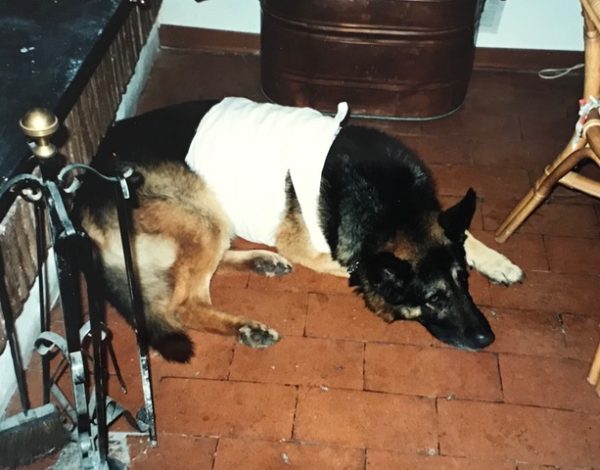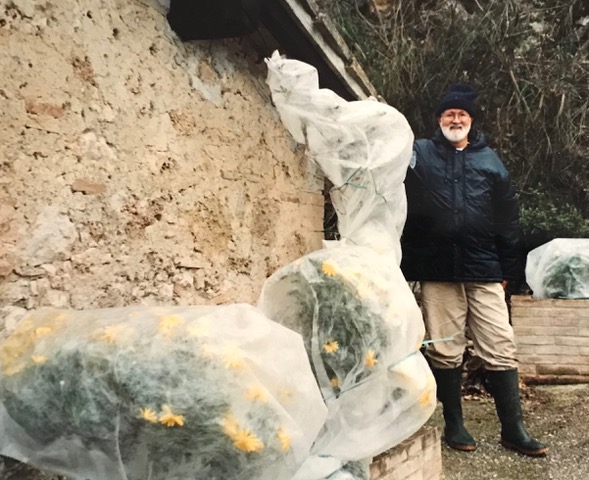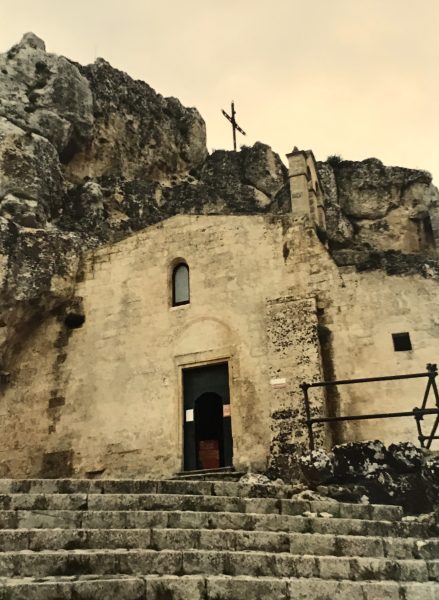#62: Italy, Scotland and USA, January – June, 2007 Animal Tales, Travel Tales, Guest Tales
Traveling in Europe when you live there is as easy as traveling from state to state in America. Excellent trains and freeways make for pleasant trips from point to point. An example was my journey to Scotland to share in the celebration of a friend winning a prize for her novel. I caught a train in nearby Orte to Paris, then through the Chunnel and up to Edinburgh. Sleeping in a comfortable compartment, eating good food, looking out the window at scenery, geography and history passing by. I could have flown and been there in a matter of hours, but the great trains of Europe are too fine a treat to pass up.
For this and other true stories from our life in Italy, here are edited excerpts from monthly letters to family and friends.
Zack has pretty much recuperated from surgery. He developed a cyst after he apparently inhaled a strange seed found only in these parts. The plant takes up silica from the soil, tips the pointed seed with this hard substance and jettisons the shuttlecock shape out into the world, where animals, nose near the ground, inhale it. The seed then works its way through the body until it exits, usually somewhere around the rib cage. Except it didn’t exit for ol’ Zack. We waited six months, while the cyst grew, opened and drained but didn’t shuck out a seed. So he had surgery after we returned from SE Asia (see previous post). The vet found not one, but three pointy seeds in the cyst. We’ve spent the last two weeks frantically, desperately trying to keep Zack from licking and scratching the incision so it could heal. His nose is too long for the usual “Elizabethan collar,” and he thinks a muzzle is just another challenge to get his tongue through. Despite the vet’s instructions about not putting on a bandage, I finally used an old Leonard Swing technique: tearing a sheet into wide strips and wrapping Zack from shoulder to weenie. That did the trick and now he’s well on the mend.
February
You’ve probably heard about the 1000-pound canary, but what about the 1000-dollar rat? The tale begins when our windshield wiper-fluid stopped working. The washers’ tank was empty. We filled it up, but the fluid poured out onto the ground. I’d just had a headlight replaced, necessitating moving that tank, so I figured the electrician hadn’t put it back correctly. We were due for regular car maintenance, and I made a note to have the mechanic check the problem. Then the ventilating fan conked out. Another note to self; it was only a couple days more until the car went in for a checkup. The next evening, we were driving through Amelia, and all was literally revealed. A rat came out from under the hood, ran along the base of the windshield and peered at us with twitching nose. Eureka!! A rat had moved into the car while we were in Asia, made itself at home and started eating everything in sight. Sure enough, the checkup confirmed not one, but two rat nests and lots of chewed-up wiring. The final bill: nearly 1000 euros! And a good lesson learned. During the cold months, we won’t park in the carport near the woods. It’s just too tempting for shivering rats.
Happy to report that I’ve been keeping out of trouble working outside with Graziano. First, we two pruned and re-tied the grapes. The arbor should be totally covered this year. Then we transplanted a huge pyracantha, so the mason and blacksmith can construct a postern gate next to our property’s double gate. We’d had a pedestrian gate made of wood and metal netting on the other side of that vehicle-gate, but (a) the wood rotted and the gate started to fall; and (b) it was always awkward to use because it opened into the little brick structure that houses the electric meters. Once this work is finished, we’ll be able to unlock a metal gate and go through on foot whenever we need to.
March
A year with no winter. That’s what we thought we were having, fall transforming into spring with trees and flowers all blooming four to six weeks early. Then we started hearing rumors that very bad weather was coming in a couple weeks. The old timers said it had happened like this before, but we didn’t believe a forecast that far in advance. Yet the week that spring officially arrived, winter came with a vengeance. We wrapped up the most vulnerable plants, some of which were in bloom or sprouting; we unhooked the hoses and got them under cover; we brought a wood supply indoors and put more under cover outside in case the radiator heat went out; we made a big kettle of minestrone; and we hunkered down. Just as predicted, there came falling temperatures, lashings of rain, high winds, lightening and five bouts of hail. The cold weather lasted over a week, and we were all heartily sick of it by the time it headed back north. Now spring has returned, albeit cooler than it had been. The tulips are up, the trumpet vine is sprouting, the birds are nesting and all, we hope, will be well.
Three years ago, Fiona Dunscombe and I met at the Winchester Writers Conference, and a friendship developed. We stayed in touch, and she later sent me the first draft of her novel for my in-depth comments. It’s a very dark, modern tale about a young woman who sinks way down before she finds the wherewithal to rescue her life. I wrote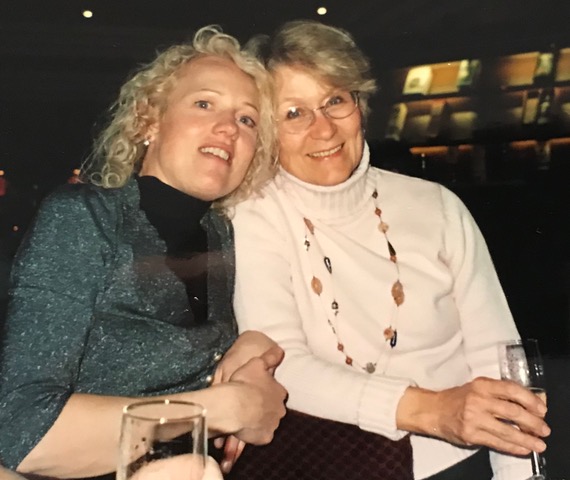 detailed feedback on every page and encouraged her, when she asked my opinion, to submit the book for the Dundee Prize in Literature, given to unpublished first novels. The prize is 10,000 pounds and the publication of the novel. And she won! I was invited to the awards ceremony because I’m mentioned in the Acknowledgements as “first and foremost” among others she wanted to thank after her husband. Traveling to Scotland for the ceremony seemed a bit far and frivolous, but Russell encouraged me to make the effort, and I’m glad I did. It was very moving to hear her name called, see her step out of the audience and receive the award. Suddenly her life has changed. A PR specialist from the University (one of the prize’s two sponsors, along with the city) was escorting her through the minefield of media interviews. That evening, we sat in a bar, friends and family, watching her on BBC, and the next morning, she was on the front page of the Dundee paper. Really special being with her and celebrating the beginning of her new world.
detailed feedback on every page and encouraged her, when she asked my opinion, to submit the book for the Dundee Prize in Literature, given to unpublished first novels. The prize is 10,000 pounds and the publication of the novel. And she won! I was invited to the awards ceremony because I’m mentioned in the Acknowledgements as “first and foremost” among others she wanted to thank after her husband. Traveling to Scotland for the ceremony seemed a bit far and frivolous, but Russell encouraged me to make the effort, and I’m glad I did. It was very moving to hear her name called, see her step out of the audience and receive the award. Suddenly her life has changed. A PR specialist from the University (one of the prize’s two sponsors, along with the city) was escorting her through the minefield of media interviews. That evening, we sat in a bar, friends and family, watching her on BBC, and the next morning, she was on the front page of the Dundee paper. Really special being with her and celebrating the beginning of her new world.
Now that I’ve finished the first draft of my mystery novel, I’ve started sending it to folks for their feedback. Next, I must write a synopsis and edit the first chapter the best I can in order to submit the book for the Debut Dagger competition. The submission is due 15 April, and the award will be sometime in June.
Imagine that thousands of years ago, Stone Age people arrived at the Grand Canyon and found cliffs of soft volcanic rock. They moved into natural caves and began to improve them, digging further into the tufa, hollowing out, creating rooms. They dug other caves from scratch and enlarged them. Millenia passed, and religious hermits took over the caves, now below the town that had grown on the plain above. They, too, enlarged the caves but also enclosed the openings with masonry, creating chapels, churches and monasteries. Then the times changed again, and folks began to move down off the plain and into the structures dug in the cliff face. Multi-roomed houses were constructed by linking several caves or by digging out more rooms. Facades were made fancier by those who had the wealth to do so.
By the 1950s, only the very, very poor remained, living in squalor so unimaginable that people visiting from cities couldn’t believe that they were in the same country. Finally, the government built low-cost housing up on the plain and forcibly moved the destitute out of the cave-dwellings. Too late to help the poor, UNESCO declared the site one of the 1000 cities and structures that are the World Heritage of all humankind. Artists and artisans, hoteliers and restauranteurs, plus a few regular folks moved back. Slowly the cave dwellings were cleared, cleaned and converted into structures with new uses. Film-makers of many nationalities came to make movies using the area as a location for sites now lost to history. Tourists began to arrive singly and in groups. The economy of the whole region was renewed, and now the cave-structures cost more to buy and renovate than anyone could have imagined even ten years ago. That’s the history of Matera, the town we explored during Easter Week.
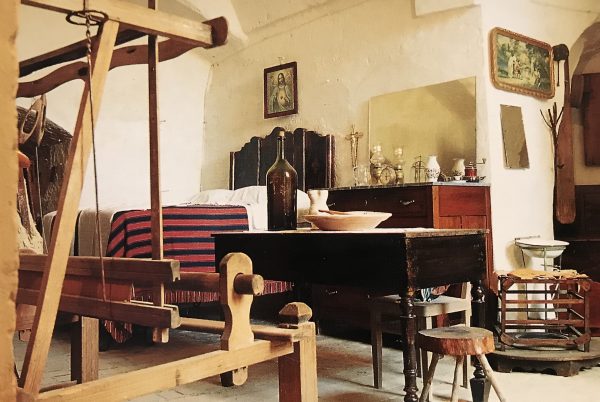 Located far south, in the mountains above the gulf that separates the “heel” from the “toe” of the Italian peninsula, Matera has much to offer visitors. We both agreed that perhaps the most interesting single site was the recreation of a real one-room dwelling from the memories of the now-adult children who had lived there in the fifties. Although it’s currently much sanitized, imagine eight people living in a room about 15 x 20 feet. The infant slept with the parents in the double bed. The toddler slept in a cradle at the foot. The next largest child slept in the bottom drawer of the single bureau, and the larger children slept on corn-husk pallets unfolded onto the bureau and a chest. The home was heated in winter by a charcoal brazier and the residual warmth from the cooking alcove. Neither of these two fires was vented in any way. Also inside the room were a mule, a cow, a pig and chickens, as well as a section at the back for preserving the manure for use on the fields. There was no bathroom anywhere near. Slops were collected in a single, tall chamber pot and added to the manure. This “home” looks rather charming now, but it must have been covered in soot and filled with a miasma that caused constant disease.
Located far south, in the mountains above the gulf that separates the “heel” from the “toe” of the Italian peninsula, Matera has much to offer visitors. We both agreed that perhaps the most interesting single site was the recreation of a real one-room dwelling from the memories of the now-adult children who had lived there in the fifties. Although it’s currently much sanitized, imagine eight people living in a room about 15 x 20 feet. The infant slept with the parents in the double bed. The toddler slept in a cradle at the foot. The next largest child slept in the bottom drawer of the single bureau, and the larger children slept on corn-husk pallets unfolded onto the bureau and a chest. The home was heated in winter by a charcoal brazier and the residual warmth from the cooking alcove. Neither of these two fires was vented in any way. Also inside the room were a mule, a cow, a pig and chickens, as well as a section at the back for preserving the manure for use on the fields. There was no bathroom anywhere near. Slops were collected in a single, tall chamber pot and added to the manure. This “home” looks rather charming now, but it must have been covered in soot and filled with a miasma that caused constant disease.
The modern renovations have resulted in all sorts of charming structures. We stayed in a hotel and ate in local restaurants down in the sassi (literally “stones,” a term used for all forms of rock, from mountains to boulders). All featured vaulted ceilings cut from living rock. But it must be noted that these modern renovations are all equipped with de-humidifiers that produce a gallon of water every 5-6 hours. (Or at least they did when we were there, admittedly during a period when it was raining off and on.)
We returned to Amelia in time for Easter, which we shared with friend Ruth when her family got mixed up about dates and didn’t arrive until the day after. Not done celebrating, we drove down to Porto Ercole for Russell’s birthday on the 15th. An absolutely gorgeous day to be at the shore, sunny and warm. We ate fried calamari on a restaurant verandah overlooking the harbor. When Russell’s dessert arrived, it was decorated with a small fireworks display!
May
Now home after our five-week visit to the States, from East to West. So very nice to have been in personal touch with American family and friends after months of letters and emails.
We enjoyed sampling the varieties of food America has to offer — barbecued pork with cole slaw in North Carolina, meatloaf in a roadside restaurant in South Carolina, Boston cream pie in Hilton Head, crab cakes wherever I could find them, ham salad in West Virginia, Lebanese lunch in Virginia, sushi in Portland, Mexican dinner in Los Angeles. I know that the issue of immigrants is a controversial one in the States now, but surely we can all be thankful for the wonderful cuisines they’ve brought us.
Some travel scenes:
- Driving across the flat piney woods and swamps of South Carolina, raptors floating on the thermals high above. Have they learned to search for road kill? Do the traffic and hot asphalt create those updrafts?
- Seeing the Appalachians rise like a wall at the southern border of West Virginia, crossing the impossibly high New River Gorge bridge, past Rainelle, where my ancestors lived, and over the Meadow River, which gave its name to the lumber company that hired its first college graduate over 100 years ago, Leonard Goble Swing.
- Being in hometown Clarksburg on Mom’s birthday and later having a steak at the Wonder Bar, still there after more than 50 years.
- Walking around the Wisconsin State Capitol Building with its wonderful plantings — giant, granite-walled, raised beds filled with just a single species of flower, red tulips in one, purple pansies in another. Very effective.
- Experiencing the spectacular Oregon scenery — mountains falling into the sea interspersed with sandy coves; the perfect cone of Mt. Hood first passing right under the wing of our plane, then hovering over Portland and finally coming closer and closer on a day-drive until we arrived at the famous Timberline Lodge, still above snow-line in May; the impressive Columbia River Gorge as seen from the scenic highway built in the 30s — one can easily imagine awestruck Lewis and Clark canoeing downriver.
- Realizing I’d figuratively begun and ended my trip with William Clark, whose family gave its name to Clarksburg, WV and who explored Oregon long before I did.
This exploration was the first in our efforts to identify where we’d like to live when we return to the States. We know we can’t stay in Italy forever. There are almost no facilities for seniors, because the extended family takes care of them. We’ll need to return to North America, and we started the search in Oregon with this year’s trip.
June
This has been a month of full-tilt boogie. We got back home on the 29th of May and immediately set to work cleaning house and prepping the garden for the arrival of two sets of guests. In the middle of all this, a serious storm knocked out all telecom lines in the region, and we ended up with no phone, fax or email for over two weeks, despite repeated requests for repairs.
But a sorority sister and new hubby were determined to find us, even if they couldn’t reach us via any comm. line. And sure enough, they did, despite the added challenge of speaking no Italian. After a pleasant couple of hours of conversation over fruit and cheese, they headed back to their villa-rental some 2+ hours away.
The next day, we got up bright and early and drove down to the Rome airport to pick up best friends from our Kazakhstan days — Valodya Fedorov, wife Ludmila and daughter Katya. (See blog posts #29-35.) What a happy reunion, everyone teary-eyed and marveling that it was even possible to come together again. Who would have thought even 15 years ago that we would spend two years in Central Asia and that these former Soviet citizens would be able to come so easily to the West?
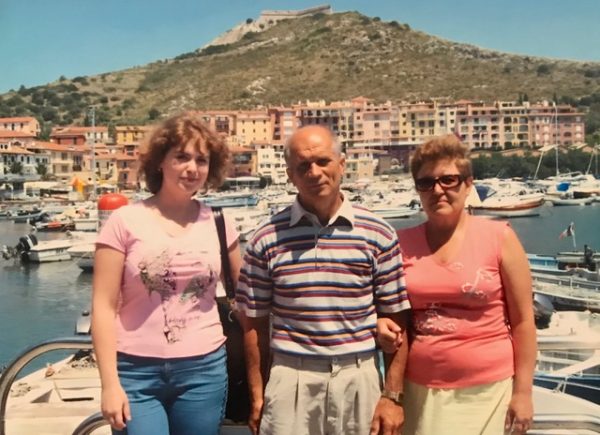 Valodya, in particular, was like a kid let loose from school. We truly had the impression of a free spirit trussed all those years, now liberated to be himself. “Krasivyy!” (“Beautiful!”) he kept exclaiming as we toured L’Aquila high in the mountains, Porto Ercole by the sea and the Colosseum, Forum and St. Peters in Rome. He eagerly tried every food set before him, volunteered to “khelp” inside and outside the house, marveled at the tube Italians use to direct a strong breath where a fire most needs it, etc. etc. Ludmila was less demonstrative, more stereotypically Russian and reserved, but it was clear she enjoyed her visit, asking her daughter to interpret her burning question: “How much does it cost to buy a house here?” Katya, now working for a German medical firm and presumably earning euros, took Russell aside one evening for some financial advice.
Valodya, in particular, was like a kid let loose from school. We truly had the impression of a free spirit trussed all those years, now liberated to be himself. “Krasivyy!” (“Beautiful!”) he kept exclaiming as we toured L’Aquila high in the mountains, Porto Ercole by the sea and the Colosseum, Forum and St. Peters in Rome. He eagerly tried every food set before him, volunteered to “khelp” inside and outside the house, marveled at the tube Italians use to direct a strong breath where a fire most needs it, etc. etc. Ludmila was less demonstrative, more stereotypically Russian and reserved, but it was clear she enjoyed her visit, asking her daughter to interpret her burning question: “How much does it cost to buy a house here?” Katya, now working for a German medical firm and presumably earning euros, took Russell aside one evening for some financial advice.
Their visit was too soon over, and on their last day we decanted olive oil from our cantina’s cache into two five-liter tins, so they could take this new experience of Italy home. Along with one of those fire-tubes! As we said goodbye amid tears at the Rome airport, I had the strong presentiment that we’d be seeing them again. Here, in Europe.
Their sojourn was book-ended by two medical challenges. I twisted my ankle just before they arrived and ended up wearing an elastic support for the first few days of our Fedorov-touring. More seriously, Russell’s knee swelled up the night before they left and was so painful he had to be helped to bed, Valodya and Nancy each under an arm. A trip to Russell’s Rome orthopedist and an MRI revealed not our feared return of a flaking kneecap that led to arthroscopic surgery some 20 years ago. Instead, the doc diagnosed an over-worked joint pooped out from three days of sightseeing and recommended a slow but steady return to normal life, supplemented by swims in our neighbors’ pool. Meanwhile, the full-tilt boogie continued as I took on his chores in addition to my own and acted as the family’s only driver for a while.
So we’ve been somewhat crippled but unbowed, feeling lucky to live in such a wonderful place with good medical care, fine friends near and far, many of whom come to our door as seasons pass.

COMING NEXT MONTH
#63: USA, Umbria, Sardinia and Sri Lanka
Elder-Help, Heat and Drought, Ancient Towns, South Asian Wedding

LET ME HEAR FROM YOU.
Please take a moment to share your thoughts.
Your comments help make the blog better, and I always answer.
* * *
If you enjoyed reading this post, I hope you’ll SUBSCRIBE by clicking on the button below. Every month, when I post a new excerpt from my life overseas, you’ll get an email with a link so you can read the next installment. Subscription is free, and I won’t share your contact information with anyone else. Your subscribing lets me know you’re reading what I write, and that means a lot.

